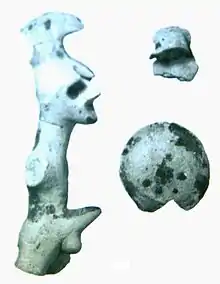Polizzello archaeological site
The archaeological site of Polizzello or mountain of Polizzello[1] was a site inhabited probably from the eleventh to the sixth century BC
 | |
| Location | Mussomeli, Province of Caltanissetta, Sicily, Italy |
|---|---|
| Region | |
| Length | 877 |
| History | |
| Periods | Bronze Age |
| Cultures | Sicani, Sicels |
| Site notes | |
| Excavation dates | late 19th century |
| Archaeologists | Dario Palermo |


The name apparently derives from the tyrant Polyzelus.[2][3][4] According to another thesis the name derives from the Greek πολις Ειθηλος (Polizzello), although so far there is no archaeological evidence that may indicate the presence of a Greek settlement in the area.[5]
The site is located on a hill at 877 m above sea level and is near Mussomeli in the Province of Caltanissetta.
The site is great for a human settlement for its easily defensible position and for the presence of water sources. It consists of two plateaus of which the upper smallest one is home of Acropolis and place of the first protohistoric and archaic settlement, moreover; the site has an east–west orientation with a single access from east.[6]
Historically, the site had three significant phases:
- Early Bronze Age (19th–16th centuries BC), of which remain some chamber tombs of Castelluccio period and a circular hut with ornaments placed on the eastern side of the mountain.
- 11th–9th centuries BC with the creation of an Acropolis placed on top of the hill.
- 8th–6th centuries BC, period of maximum development of the center, of which remains a monumental fence that runs along the edge of the terrace on the hill and a series of circular buildings: Sacelli, places of worship. Inside which exceptional historical artifacts have been found including the Polizzello helmet of Cretan workmanship and a clay figurine of ithyphallic warrior (The Warrior of Polizzello).
Of the fifth century BC are the remains of the House of Temenos. This is a residential building with multiple rooms.
See also
- Castelluccio Culture
- Monte Grande (Palma di Montechiaro)
- Vassallaggi
- Castelluccio di Noto
Notes
- Dario Palermo. "D. Palermo, L'Acropoli di Polizzello fra l'Età del Bronzo e il VI secolo a.C.: problemi e prospettive -". Academia.edu. p. 310.
- "Polizello". mammasicily.com. Archived from the original on 2015-06-26.
- "Storici in Sicilia: Tucidide, Diodoro, Erodoto, Cicerone ..." Archived from the original on 2015-09-24.
- Guglielmo Capozzo (1840). Memorie su la Sicilia: tratte dalle più celebri e accademie e da distinti libri di società letterarie e di valent'uomini nazionali e stranieri : con aggiunte e note. Virzi. pp. 27–.
- "www.bretschneider-online.it" (PDF). Archived from the original (PDF) on 2015-09-23.
- Dario Palermo. "Polizzello -". Academia.edu. p. 105.
Further reading
- Rosalba Panvini; Carla Guzzone; Dario Palermo (2009). Polizzello: Scavi del 2004 nell'area del santuario arcaico dell'acropoli. Regione Siciliana - Assessorato dei Beni Culturali, Ambientali e della Pubblica Istruzione Dipartimento dei Beni Culturali, Ambientali, dell’Educazione Permanente, dell’Architettura e dell’Arte Contemporanea. p. 84. ISBN 978-88-6164-132-7.
- Giuseppe Castellana (2002). La Sicilia nel II millennio a.C. Palermo: Salvatore Sciascia Editore. ISBN 88-8241-130-3.
- Jean Huré (2005). Storia della Sicilia dalle origini ai giorni nostri. Brugherio (MI): Brancato Editore. ISBN 88-8031-078-X.
- Salvatore Piccolo (2007). Antiche Pietre. La cultura dei dolmen nella Preistoria della Sicilia sud-orientale. Morrone Editore. ISBN 978-88-902640-7-8.
- Salvatore Spoto (2002). Sicilia antica. Roma: Newton Compton Ed. ISBN 88-8289-750-8.
- Sebastiano Tusa (1999). La Sicilia nella preistoria. Palermo: Sellerio Editore. ISBN 88-389-1440-0.
- Giuseppe Voza (1999). Nel segno dell'antico. Arnaldo Lombardi Editore. ISBN 88-317-2606-4.
External links
- La Civiltà Castellucciana
- Luigi Bernabò Brea, La Sicilia prima dei Greci, 1958
- Mambella, Raffaele. "La problematica dei sacelli circolari del santuario sicano di Polizzello (CL)" (PDF). www.bretschneider-online.it. Archived from the original (PDF) on 2015-09-23. Retrieved 2015-06-25.
- Dario Palermo e Davide Tanasi, Diodoro a Polizzello
- "Descrizione del sito di Polizzello". www.mussomelilive.altervista.org.

